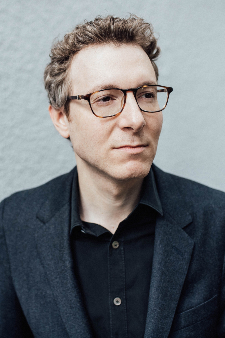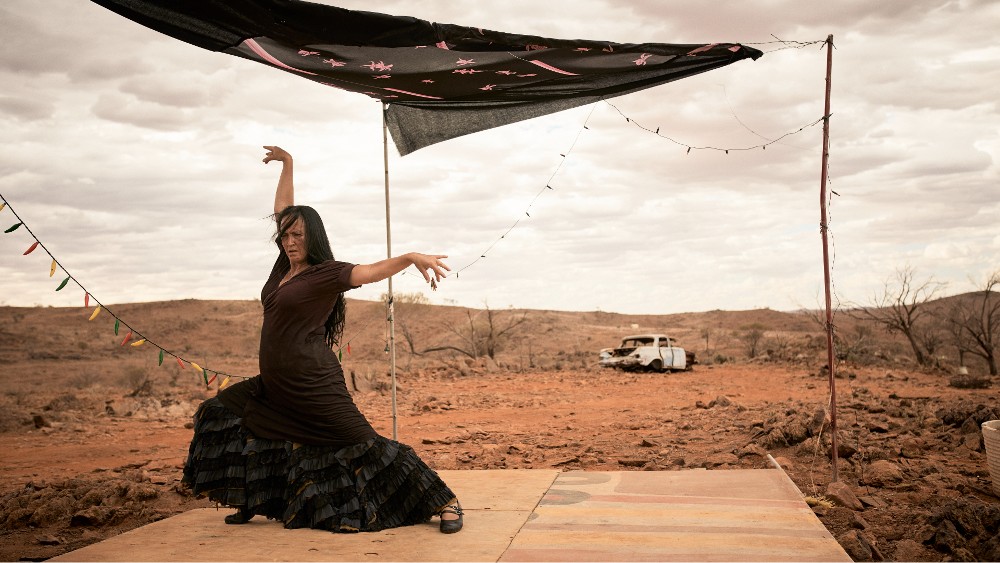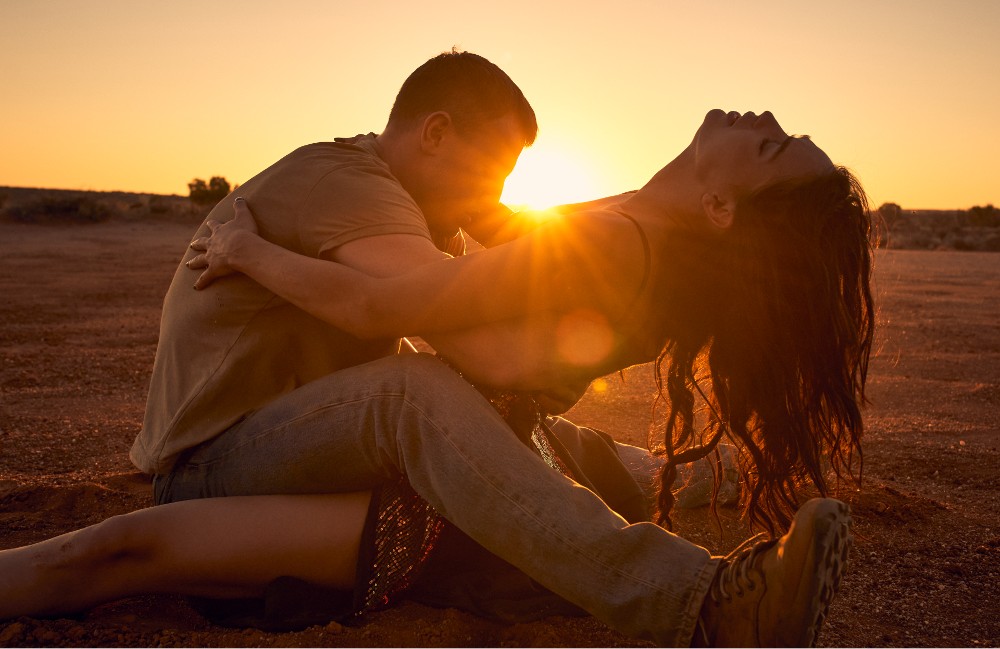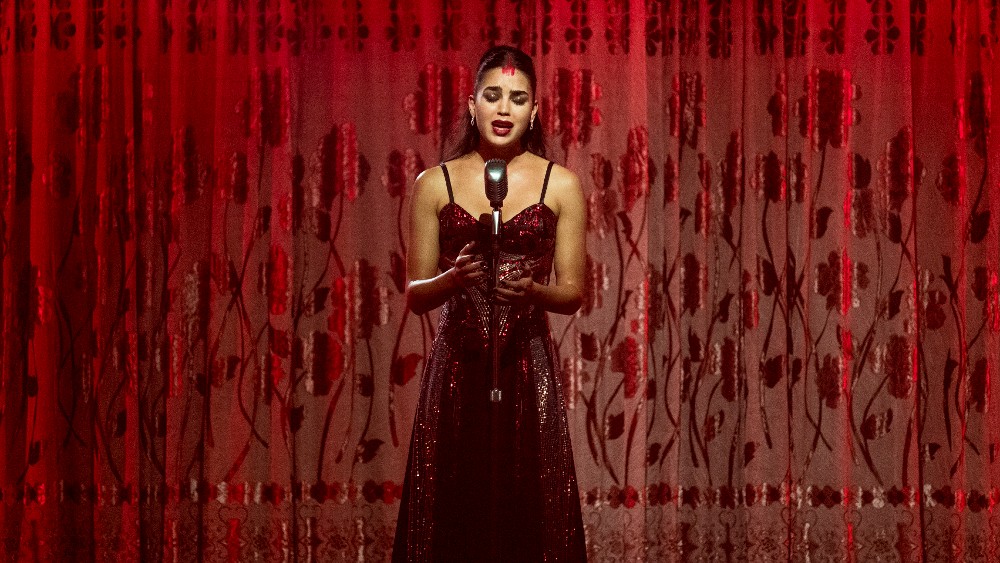
Director Benjamin Millepied’s feature debut, Carmen, is a gorgeous work of art that combines cinema, music, and dance. The latter aspect might not be as surprising based on Millepied’s background as a choreographer, but Millepied’s main musical collaborator on the film was Emmy winner and Oscar-nominee Nicholas Britell, who has been keeping fairly busy in recent years, mainly scoring Succession for HBO.
The central storyline for the movie, which is indeed a modern adaptation of Bizet’s opera Carmen, involves Melissa Barrera (In the Heights) playing the title character, a Mexican dancer who tries to escape Mexico after her grandmother is killed by the cartel. While crossing the border, she ends up being attacked and then saved by a former Marine named Aidan, played by Oscar nominee Paul Mescal (Aftersun).
Millepied’s Carmen doesn’t use any of the songs or music from the renowned opera, instead featuring all-new work from Britell, including songs performed by the film’s two leads. Britell’s score, and the songs he co-wrote with Julieta Venegas, Taura Stinson, and L.A. rap legend, The D.O.C., are key components in driving the story, which features many show-stopping dance numbers, but still maintains the drama and pathos of Bizet’s tale.
Below the Line got on Zoom with Britell for our latest interview, this one mostly focused on his work on Carmen.

Below the Line: What led you to score and write songs for Carmen? Did you know Benjamin Millepied beforehand? How did you meet him and get involved?
Nicholas Britell: I’ve been friends with Benjamin for… I think I met Benjamin about 15 years ago, and from the very beginning, when we first met actually, I felt in a lot of ways we were artistic kindred spirits. He’s so multi-talented — he’s an incredible choreographer and dancer, but he’s also an amazing photographer, and was making short films. I remember seeing some of the short films pretty early on after we met. It was actually something that, from the very beginning, I was always curious, and we would talk about what his feature film was going to be when he made one. We produced a lot of projects together over the years — dance films, short films, commercials – we actually did a lot of producing together on things. We always had a lot of creative collaboration in that sense.
We had never worked on a feature film together, obviously. I found an email from him. It was actually 10 years ago that he sent me an email and he said, ‘I want my first feature to be a reimagining of Carmen.’ What I took from the early notes from him was he really wanted it to be a starting point, as inspiration. We weren’t going to just adapt Carmen. He wanted it to be something that was really different and his own, in a sense, and I felt similarly strongly that there have been so many incredible adaptations of the opera and the Bizet over the years, for sure, both on stage and on screen. For me, I felt very strongly that I did not want to rearrange the Bizet music. The Bizet music is incredible, but that wasn’t something that I wanted to do.
I said to him, ‘If we’re really reimagining this, I think it should be an original score, and it should be original songs, and then really take it into almost like a parallel universe of what Carmen is. ‘That was the beginning, and obviously, it was a very long process. And it was years and years and years of gestation period of this, but we’ve spent years talking about it. I think in some ways what was exciting was just the sense of experimental freedom that Benjamin brought to it. This wasn’t something that was going to be straightforward, in the best way. I would say it was something where we were going to explore it together.
I think some of it was about finding feelings, both in the film and in the music and in the movement, the dance. It was a feeling I think he was looking for that he wanted to feel in the movie that I wanted to feel in the music. That was in a way what we were after, so there was a lot of writing of music that I did. I wrote the dances, obviously, before the film was shot, and then we brought in these incredible songwriting collaborators that we were so lucky to work with — Julieta Venegas, Taura Stinson, and the DOC, and each brought their own unique brilliance to the songs, and we worked on those.
What was really kind of special for me was that, even after he had shot the film, and we had done the songs, there was still a lot left to figure out as far as the score. It was this whole other process of experiment that led me to this discovery of the idea of using a choir in the score, and the way in which the score would actually function in the movie, which is very different than the score functions on any other movie I’ve ever worked on. [chuckles] I didn’t know that’s what we were going to do. I think that’s what I love about working on films, which is that personally, I approach each project like you’re starting from scratch, and you say to yourself, ‘What do we do here? And what is the right…’

Actually, last week, Barry Jenkins and I did some concerts with the San Francisco Symphony. We were doing some talks, and we were talking about how when you’re working on a film, the film teaches you things, and you learn from the film as you go. I felt that very strongly on Carmen where, as I went through it, initially, in post-production, I started thinking, ‘Oh, maybe the score could be something like this.’ As I went, I realized that it wasn’t going to be in that direction at all.
There was this one day in particular, it was that scene in the motel when Carmen and Aiden are first together in private, and basically, they’re first speaking with each other to a certain extent. I had this idea of what if there was a choir in the score, and what if it was almost like an ancient Greek chorus that’s perhaps commenting on the lives of the characters, but is almost a character itself. It’s almost present in the film. I remember I was with Benjamin when I had this idea, and I turned around, and I said to him, ‘Is this totally crazy?’ And he said, ‘No, I actually think it’s a great idea.’ I started experimenting with it, and it just felt right for the film.
And then the big question is, ‘Well, what are they saying?’ What we realized was that there was this ghostly counterpoint that was possible, if we were actually to take the lyrics from the original opera in French, and adapt them and rearrange them and take them and sort of poetically place them into my original music. If it would actually create this poetic relation between what the choir is saying and what’s actually happening on screen, and that’s what we did.
BTL: I’m pretty well-versed in opera, but Carmen was never one of my favorites. I’ve always felt it was opera for tourists, but your score reminded me more of Orff’s “Carmina Burana,” which is obviously heavily choral and monstrous.
Britell: Interesting, and to be frank, the music that I wrote for Carmen is totally unrelated to the music for Carmen, 100 percent unrelated. That was really the key for us, and really, for Benjamin in particular, Carmen was his starting point. It was his inspiration, and then I was trying to react to Benjamin’s vision. To me, that felt like the music that came out of that is what it was, and there is more of I feel… you were saying “Carmina Burana” — there is kind of an ancient choral feeling to the score that I wrote.
My hope is that there’s also a sense of a dream world or a dream state that you enter into, and that the score is in a dialogue with what’s happening in the film, almost literally, to some extent. The choir is literally communicating with the characters. I’ve never done that before, and I’m not really sure I’ve ever seen that done before. To me, it was certainly an experiment, but we were moved by it, and I feel, ultimately, that’s what the process of filmmaking is about. When you’re making these things, you follow your instincts, and you see where they take you.
BTL: When I spoke to Benjamin, he mentioned Bernard Herrmann as an influence, and when I listened to the soundtrack, I did hear that a little. As a composer, you must get tired of Bernard Herrmann being used as a reference, since I’m sure every composer gets that thrown at them all the time.
Britell: What was wonderful was that Benjamin never gave me any temp tracks. There was never anything at all of, ‘Oh, we should have a piece like this.’ It was more, I think what we were talking about was there are certain films where the music really takes a featured role that almost becomes a character in the film.
For example, Benjamin loves the way that Herrmann’s score in Vertigo is such a part of the movie. You almost can’t imagine Vertigo without Herrmann’s score. I think that was the kind of thing that he was saying, in a sense of it was more about the concept of a score like that, as opposed to the music itself. That’s obviously very helpful in that way. There was never a moment where Benjamin prescribed a direction to me. He always said, ‘What do you think?’

BTL: You knew that dance was going to be a big proponent of this movie, so is it harder to write music that he will have to choreograph later? How do you two go back and forth even before the movie starts filming to create something he knows will be as powerful as he wants, in terms of dance?
Britell: It’s a great question, because, interestingly, that was part of the process in a way, besides the discovery of the choir, the dances were the part of the process that surprised me almost as much. I imagined that Benjamin, he’s such an incredible choreographer, I imagined that I would write pieces, and that he would have a lot of notes. And that then, as he imagined it, we would shape it. Fascinatingly, I wrote these pieces, and he would hear them and he basically would say, ‘Okay, great.’ He had almost no notes, really, and he would just take my piece, make a dance to the piece, and film a whole scene around the music.
The film was set to the music, which is very different than usual, and to me, was kind of amazing. That whole sequence towards the end of the film with the D.O.C. in the climactic match, that was something where I wrote that track, worked on it with the D.O.C., gave him the music, and then he made a whole scene in a movie out of that piece of music, basically. It was quite wonderful.
Obviously, I’ve gotten to know Benjamin very well over the years, and I think we had a sense of what we were each going for. That made that possible, in a way. He was very present while I was writing things. Some of these pieces I wrote at his house in Los Angeles with him right there. There was really a sense of togetherness to our process. It wasn’t like I was just sending him files and saying, ‘Here you go.’
BTL: I would think as a choreographer, especially working at the Paris Opera, he must be used to that thing where the music is already set in stone. It’s not like he’s gonna go back and tell some dead composer, ‘ I want to do something different.’ He’s used to basing what he does on existing music.
Britell: That’s a very good point. Certainly, for preexisting historical works, you’re totally right. He would have taken the music and would have choreographed to that, so it is part of his process. But I was always available for notes. As a composer, [and] certainly as a film composer, I love getting notes, and I love feeling like we’re creating something together. I get a lot of joy out of that, so I was always open to notes, but he was very instinctively supportive of the music almost from the get-go.
BTL: Can you talk about some of your other collaborators on the songs? Last time we spoke was for Don’t Look Up, the song you did with Ariana Grande and Kid Cudi. I have to imagine, as a composer, it’s nice to work with all these other artists who come from different styles of music.
Britell: Actually, it’s cool you bring up that some, because interestingly, the other songwriter on the song from Don’t Look Up was Taura Stinson, and interestingly, working with her on that and working with her on Carmen as well, I can’t say enough wonderful things about Taura. She’s totally brilliant, and one of the most instinctive and beautifully musical collaborators that I’ve ever worked with, that I could even imagine. It was just wonderful working with her. The lyrics that she wrote, for example, for “Slip Away,” were so beautiful, to me they feel like they’ve always existed. And then, working with Julieta, and working with the D.O.C., I love working with other songwriters and artists. It’s a wonderfully different part of the process.
I will say [that] writing on-camera music is a lot of work, because you not only have to figure out the song, let’s say. But then, you also have to figure out the production of it, actually, how are you going to do it and how It’s going to be performed. And then, in post, you have to figure out how to mix. There are so many different things to come together. I will say that what was really amazing about, shouting out Paul and Melissa for their performances, they performed everything live on set. Those songs were all done live. We had obviously recorded pre-records and things like that, but the versions that you see are all done live on set.

BTL: For those songs, are you still doing pre-records with Paul and Melissa, just to make sure they’re in a good key for them and stuff like that?
Britell: Certainly, there was a long period of time that we were talking about these things, and then obviously, also, there was the pandemic that we were in the midst of as well. For example, Melissa came over to my studio, and we worked on that “Tú y You” song together. She actually recorded in my studio, and then, we did more recordings in another studio for pre-records. One of the things that you get over that period of time of doing that is you find the right key, you find the right feeling. I was just saying to Melissa today how her pre-records in the recording studios were perfect — they were wonderful — but we still ended up using her take that was live on set, because it just felt even more natural in a sense.
BTL: It’s great talking to you again, and congratulations on how this movie turned out. I feel like between Succession and other projects, you’re very busy, so how are you able to balance your time between everything you’re doing?
Britell: I have basically been working on Carmen on and off since probably 2016. I was scoring Carmen while I was also scoring Andor and also Succession Season 3, I think. There was a lot of work. I was definitely deep in the cave working. [chuckles]
Carmen is still playing in select theaters across the country and Britell’s soundtrack is available to stream and purchase on multiple platforms.





